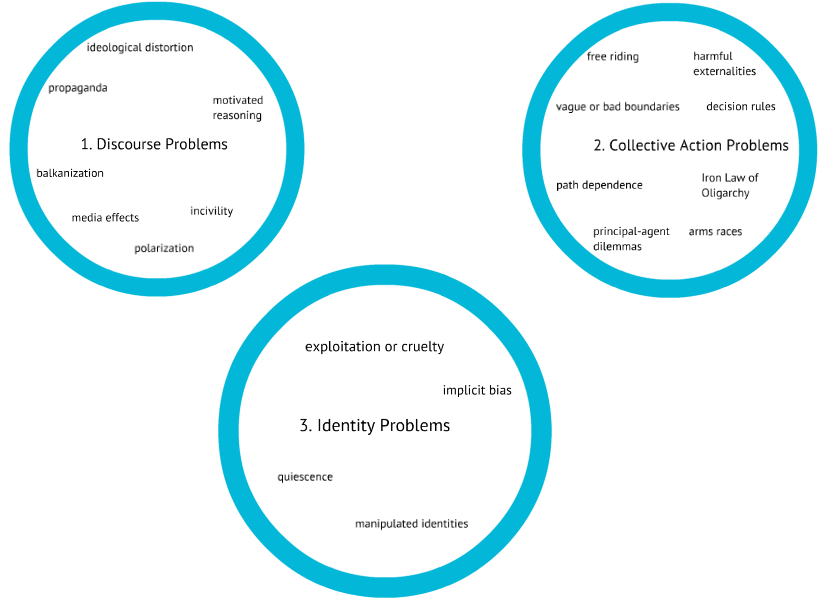(Rancho Palos Verdes, CA) Back in 2014, I argued: [Elinor] “Ostrom plus [Jürgen] Habermas is nearly all we need.” I define a good citizen as anyone who seriously asks the question “What should we do?” Citizens face a dizzying variety of hard issues, but underlying them are general categories of problems. As of 2014, I thought these were the two basic categories:
- Problems of discourse make our thoughts and conversations go badly, so that we believe or desire the wrong things. Example include our susceptibility to propaganda and our strong tendency to “motivated reasoning,” or picking facts and theories because they yield the results we want.
- Problems of collective action cause us to get results that we do not desire, even when we agree about goals and values. An example is the temptation to “free ride” on other people’s contributions, or the tendency of small groups of specialists to dominate even democratic organizations (“The Iron Law of Oligarchy”).
Habermas and the postwar Frankfurt School provide a robust theoretical tradition, linked to practical experimentation, about how to address problems of discourse. Elinor Ostrom and the Bloomington School provide an equally robust theory/practice tradition about how to address problems of collective action. That was my basis for saying that Ostrom and Habermas nearly sufficed for a civic theory.
But I now think there is a third general category:
- Problems of identity and exclusion arise when some people simply won’t deliberate or collaborate with other people because they regard the latter as fundamentally different and inferior. Relatedly, sometimes people feel that they themselves don’t deserve to deliberate or collaborate because they are inferior.

The theoretical resources of Habermas and Ostrom are not sufficient for that third category, and we can learn more from theorists and practitioners of nonviolent social movements. That is the tradition that tells us what to do about problems of identity and exclusion if we choose to take violence off the table.
Therefore, I now believe that Ostrom, Habermas, and Gandhi are all we need–assuming that each name is synecdoche for a whole tradition of theory and practice.
| Ostrom | Habermas | Gandhi | |
| Fundamental problem | People fail to achieve what would be good for them collectively | People manipulate other people by influencing their opinions and goals. | People fail to view others (or themselves) as fully human |
| Exemplary case of the problem | We destroy an environmental asset by failing to work together | Government or corporate propaganda distorts our authentic values | One national or ethnic group exploits another |
| Characteristic starting point | People know what they want but can’t get it | People don’t know what they want or want the wrong things | Some people won’t recognize other people |
| Essential behavior of a citizen | Working together to make or preserve something. | Talking and listening about controversial values. | Using nonviolent sacrifice to compel change |
| Instead of homo economicus (the individual who maximizes material self-interest) we need … | Homo faber (the person as a maker) | Homo sapiens (the person as a reasoner) or homo politicus (the participant in public assemblies). | A Satyagrahi (the person as a bearer of soul force) |
| Role of the state | It is a set of nested and overlapping associations, not fundamentally different from other associations (firms, nonprofits, etc.) | Citizens form public opinion, which should guide the state, which makes law. The state should be radically distinct from other sectors | A target of demands |
| Modernity is … | A threat to local and traditional ways of cooperating, but we can use science to assist people in solving their own problems | A process of enlightenment that liberates people, but it goes wrong when states and markets “colonize” the private domain | (for Gandhi) an imperialist imposition, undermining swaraj |
| Main interdisciplinary combination | Game theory plus observations of indigenous problem-solving | Normative philosophy (mainly achieved through critical readings of past philosophers) plus system-level sociology. | Critical theology plus military strategy |



